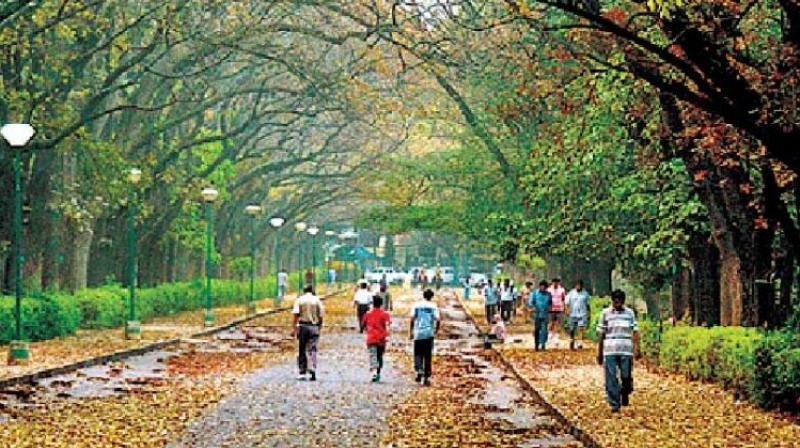Walk in the park: Please, no knee-jerk restrictions

If a road is accident prone, will you shut it during, say, peak hour traffic? Or will you put up speed breakers and have stricter enforcement on that stretch? By the same logic, if crimes take place in corporation parks in the city, does the solution lie in keeping them closed during a few hours of the day? The recent knee jerk demand by the staff manning parks to shut them around noon till the evening to keep anti social elements away, is illogical and illegal. To rein in criminals, step up police patrolling. Install CCTVs. Will merely locking the gates prevent law breakers from scaling the walls? Wasn’t a young girl Swathi hacked to death in full public glare at a busy train station? Do we lock our metro stations as well during certain hours?
It’s illegal because it goes against a corporation council resolution No.555 of 2012 which, based on representations from citizens, revised the park timings from 5 am to 9 pm without a break. However, some park walkers associations have managed to flout this resolution by prevailing upon the local contractors to lock the gates for a few hours around noon everyday. The move may be well intentioned but such associations are obviously not vested with statutory powers to overturn a resolution passed by an elected municipal body. It can be changed only by a fresh resolution or a statutory amendment or struck down by the court if it is opposed to public policy or executive action. Under Section 14 (2)(a) of the Tamil Nadu parks, play-fields and open space (preservation and regulation) Act, 1959, the local authorities are empowered to control and regulate the admission of persons and their conduct in such public places.
It is true that a majority of walkers do not visit the park at noon. And that couples, who have no privacy elsewhere, flock here for their romantic escapades. What is of concern is the entry of drunkards or drug peddlers. But what about genuine folks who work on night shifts and want to burn some calories post brunch? Spare a thought for senior citizens, some with Alzheimer’s or Parkinson’s disease, who surface a little before noon and are brought by their children or attenders for a stroll. Are they not entitled to some tree cover and fresh air and benches?
The Madras high court in G.Pandi Vs Commissioner, Hosur Municipality observed that “good parks are not only for aesthetic appreciation, but in the fast developing towns having conglomeration of buildings, they are a necessity. In crowded towns where a resident does not get anything but atmosphere polluted by smoke and fumes emitted by endless vehicular traffic and the factories, the efficacy of beautifully laid out parks is no less than that of lungs to human beings. It is the verdant cover provided by public parks and greenbelts in a town, which renders considerable relief to the restless public.” The court ruled that the government can have control even over parks and play fields which are not vested with local authorities.
The National Green Tribunal in Durga Dutt Vs State of Himachal Pradesh ruled that access to “a clean and decent environment has been held to be a fundamental right” under the rubric of the right to life under Article 21 of the Constitution. The Supreme Court in Bangalore Medical Trust Vs B.S. Muddappa had put the citizens’ right to recreate in public spaces in perspective. “Earlier it was a prerogative of the aristocracy and the affluent, either as a result of royal grant or as a place reserved for private pleasure. Free and healthy air in beautiful surroundings was the privilege of a few. But now, it is a gift from people to themselves. Its importance has multiplied with emphasis on environment and pollution.” On the subject of regulation of these spaces, the apex court sounded a note of caution. Executive authority and discretion must be “tested on the anvil of the rule of law and fairness or justice particularly if competing interests of members of society are involved.” Parks are for all legitimate users, not just local nosey parkers who form cliques and treat such public amenities as their personal fiefdom. With honourable exceptions.

